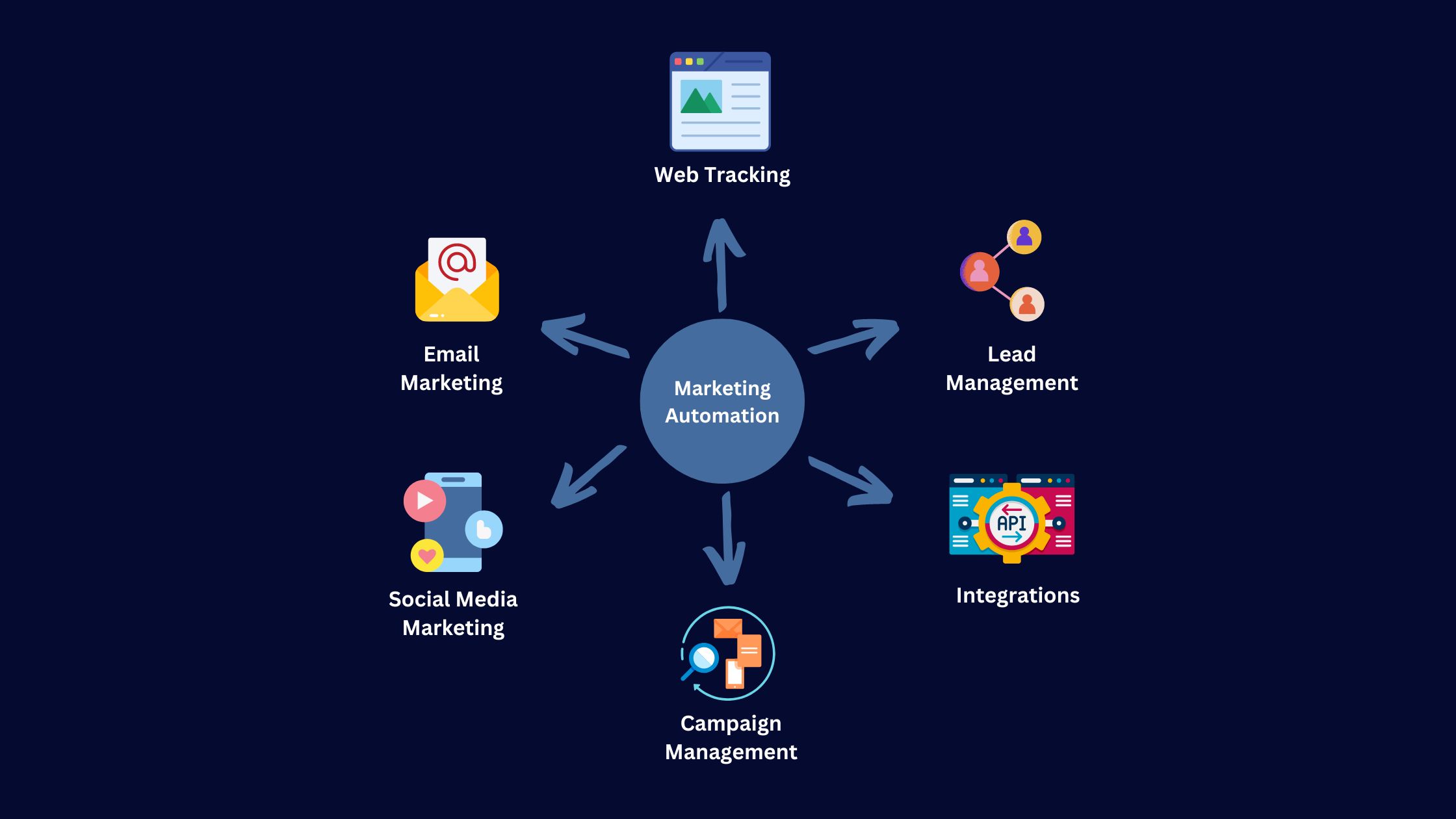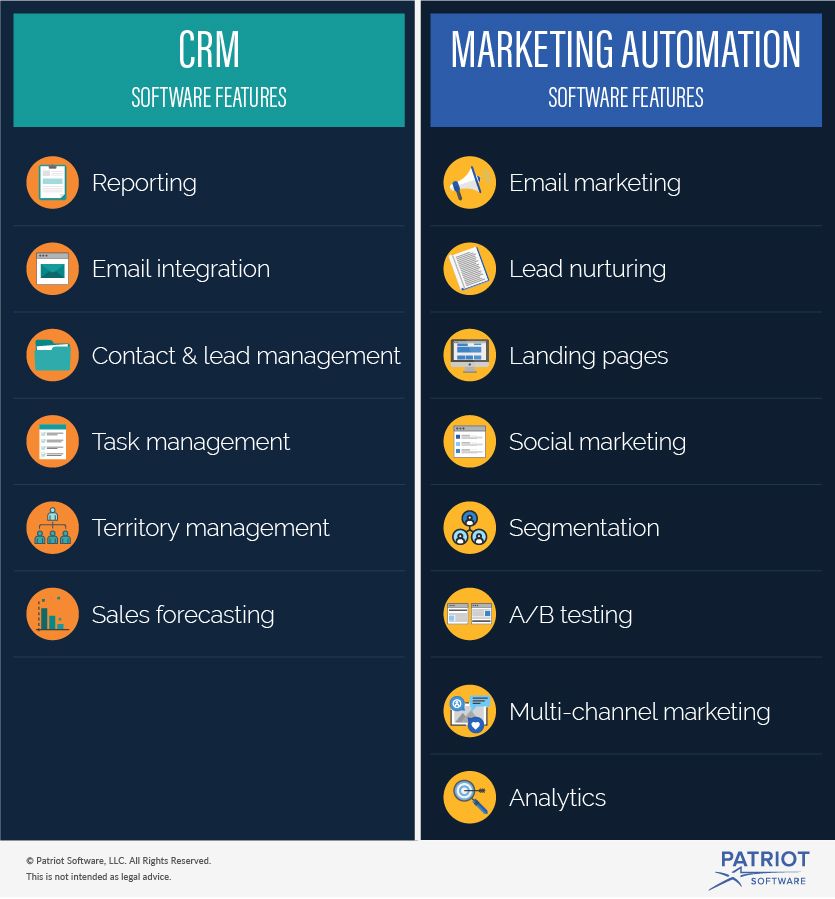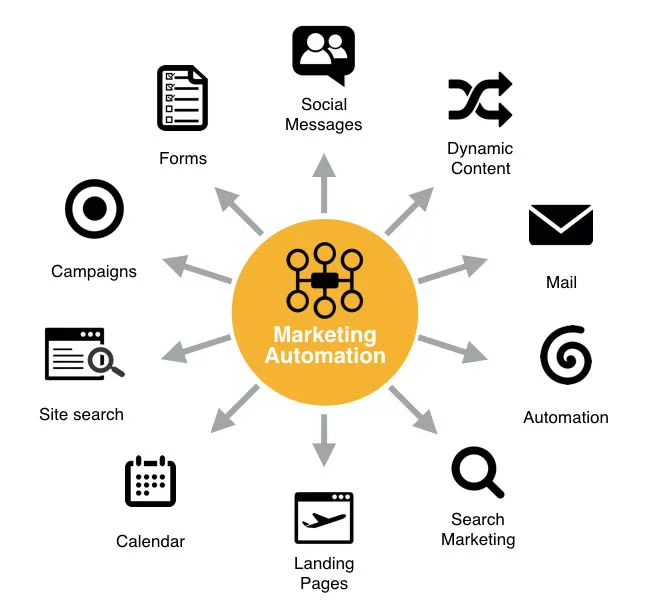Customer Relationship Management (CRM) and Marketing Automation Software are essential tools for businesses. They help manage customer interactions and automate marketing tasks.
But, they serve different purposes. Understanding the difference between CRM and Marketing Automation Software is crucial. Both tools streamline business operations, yet they focus on distinct areas. CRM software primarily manages customer data and interactions. It helps sales teams track leads and maintain customer relationships.
On the other hand, Marketing Automation Software focuses on automating marketing efforts. It schedules email campaigns, tracks marketing performance, and nurtures leads. Knowing the unique functions of each can help you choose the right tool for your business needs. In this post, we will explore the key differences and how each tool can benefit your business.

Credit: www.rolustech.com
Introduction To Crm And Marketing Automation
When you step into the world of business software, you’ll frequently hear the terms CRM and Marketing Automation. These tools are vital for managing customer relationships and automating marketing tasks. But, what sets them apart?
Purpose Of Crm
CRM, or Customer Relationship Management, software focuses on managing interactions with your customers. Its primary goal is to improve business relationships.
Imagine you own a small bakery. Using CRM software, you can track customer preferences, purchase history, and even send personalized birthday discounts. This builds loyalty.
CRM helps you understand your customers better. It enables you to provide exceptional service, turning one-time buyers into repeat clients.
Purpose Of Marketing Automation
Marketing Automation software, on the other hand, streamlines your marketing efforts. It automates repetitive tasks like email campaigns, social media posts, and ad management.
Think of it this way: instead of manually sending promotional emails to your bakery’s customers, marketing automation allows you to set up an email campaign once. It will then send emails automatically based on customer actions.
This software saves you time. It lets you focus on creating compelling content while the software handles the delivery.
Both CRM and Marketing Automation have distinct purposes. One nurtures customer relationships, the other boosts your marketing efficiency. How can these tools transform your business?
Core Features
When choosing between CRM and marketing automation software, understanding the core features is crucial. Each type of software serves distinct purposes, and knowing their key features will help you make informed decisions tailored to your business needs.
Key Features Of Crm
CRM (Customer Relationship Management) software primarily focuses on managing customer interactions and relationships. Its core features include:
- Contact Management: Keep all your customer information in one place. Easily access past interactions, preferences, and personal details.
- Sales Tracking: Monitor leads and sales opportunities. Track the progress of deals from initial contact to closure.
- Customer Support: Manage customer queries and issues efficiently. Ensure timely responses and resolutions.
- Reporting and Analytics: Gain insights into customer behavior and sales performance. Use this data to make strategic decisions.
- Task Management: Organize and prioritize tasks. Ensure nothing falls through the cracks by setting reminders and deadlines.
I once managed a small business where keeping track of customer interactions was a nightmare. Implementing a CRM system transformed our workflow, making customer management seamless and improving our sales closure rate.
Key Features Of Marketing Automation
Marketing automation software, on the other hand, is designed to automate marketing tasks and campaigns. Its core features include:
- Email Marketing: Create, schedule, and send personalized email campaigns. Analyze open rates and click-through rates to measure effectiveness.
- Lead Nurturing: Automatically guide potential customers through the sales funnel. Send targeted messages based on their behavior and preferences.
- Social Media Management: Automate social media posts across various platforms. Monitor engagement and track performance.
- Campaign Analytics: Measure the success of your marketing campaigns. Use data to refine strategies and improve ROI.
- Landing Pages and Forms: Create and optimize landing pages and forms. Capture leads and convert them into customers.
Think about the time you spend manually sending emails and posting on social media. Marketing automation can save you hours, allowing you to focus on strategy and creativity instead. Imagine the impact on your productivity!
Now, ask yourself: Are you looking to build stronger customer relationships or streamline your marketing efforts? Identifying your priority will guide you in choosing the right software for your business.

Target Users
When choosing between CRM (Customer Relationship Management) and marketing automation software, it’s essential to understand who the target users are for each. Knowing who typically uses these tools can help you decide which one aligns best with your needs. Let’s break it down to see who benefits the most from each software.
Who Uses Crm?
CRM software is primarily used by sales teams. If you’re in sales, you’ll appreciate how CRM helps you manage customer relationships more efficiently. It tracks interactions, manages leads, and ensures you never miss an important follow-up.
However, CRM isn’t just for salespeople. Customer service teams also rely heavily on it. They use CRM to keep track of customer issues, ensuring quick resolutions and boosting satisfaction.
Managers and executives benefit from CRM as well. They get detailed reports and insights, which help in making strategic decisions. If you find yourself in any of these roles, CRM might be your go-to tool.
Who Uses Marketing Automation?
Marketing automation software is a favorite among marketing professionals. If you’re in charge of campaigns, content marketing, or lead nurturing, this tool is invaluable. It automates repetitive tasks like email marketing, social media posting, and ad campaigns, freeing up your time for creative work.
Content creators also find marketing automation useful. It helps them schedule and distribute content across multiple channels, ensuring a consistent brand presence. You can focus on creating great content while the software handles the distribution.
Even smaller businesses with limited marketing teams can benefit. The automation handles the heavy lifting, allowing you to compete with larger companies. If you’re looking to streamline your marketing efforts, this software is worth considering.
So, which one suits you better? Are you more focused on customer relationships or automating marketing tasks? Understanding your role and needs can guide you to the right choice.
Benefits
Understanding the benefits of CRM and marketing automation software can help businesses make informed decisions. Both tools serve distinct purposes and provide unique advantages. Here, we will explore the benefits of each.
Benefits Of Crm
CRM software helps manage customer relationships effectively. It stores all customer information in one place. This makes it easy to access and update.
CRM systems improve customer service. They provide a complete view of customer interactions. This allows for personalized communication and better support.
CRM tools enhance sales processes. They track leads and follow-ups. Sales teams can prioritize and manage prospects efficiently.
These systems also provide valuable insights. They offer reports and analytics. Businesses can make data-driven decisions to improve strategies.
Collaboration becomes easier with CRM. Teams can share information and work together. This leads to improved productivity and better results.
Benefits Of Marketing Automation
Marketing automation software streamlines marketing tasks. It automates repetitive activities like email campaigns. This saves time and reduces manual work.
It improves lead nurturing. Automated workflows send targeted messages at the right time. This helps keep prospects engaged throughout the sales funnel.
Marketing automation tools provide detailed analytics. They track campaign performance. Marketers can measure ROI and adjust strategies based on data.
These tools enhance segmentation. They categorize contacts based on behavior and preferences. This allows for more personalized and effective marketing efforts.
Automation software boosts efficiency. It integrates with other tools and platforms. This creates a seamless marketing ecosystem for better coordination.
Integration Capabilities
When you’re diving into the world of CRM and marketing automation software, understanding their integration capabilities is crucial. It’s not just about having powerful tools but about how well they work together. Seamless integration can save you time, reduce errors, and provide a more cohesive strategy for your team.
Crm Integration
CRM integration refers to the ability of your Customer Relationship Management software to connect with other systems and data sources. A well-integrated CRM can pull in data from email, social media, and even your website. This ensures you have a complete view of your customer interactions.
Imagine you get an email from a potential client. If your CRM is integrated with your email system, that email is automatically logged. You won’t have to manually enter data, reducing the chance of mistakes.
Look for CRMs that offer easy integration with popular tools like Google Workspace, Microsoft Office, and various eCommerce platforms. This can significantly improve your productivity and keep your data consistent across all platforms.
Marketing Automation Integration
Marketing automation integration focuses on connecting your marketing tools with other systems. This allows you to automate repetitive tasks like email campaigns, social media posts, and lead scoring. When done right, it can give you more time to focus on strategy and creativity.
Consider a scenario where you launch a new product. With integrated marketing automation software, you can automatically trigger a series of emails to your customers, post announcements on social media, and even update your CRM with new leads.
Ensure your marketing automation tool integrates well with your CRM, email platforms, and analytics tools. This will help you track the effectiveness of your campaigns and make data-driven decisions.
Have you ever struggled with tools that just don’t talk to each other? Integration can be a game-changer. It’s about making your life easier and your strategies more effective.

Credit: smallbusiness.patriotsoftware.com
Use Cases
CRM software manages customer relationships and interactions. Marketing automation software streamlines marketing tasks and campaigns. Both tools improve business efficiency.
When it comes to choosing between CRM and marketing automation software, understanding their use cases is crucial. Both systems serve distinct purposes and excel in different areas. Let’s dive into the specific use cases of each to help you make an informed decision.
Crm Use Cases
Customer Relationship Management (CRM) software is like having a personal assistant for your sales team. It helps you manage customer data, track interactions, and streamline sales processes.
Sales Tracking: CRMs are essential for tracking sales activities. They allow you to monitor where each prospect is in the sales pipeline, ensuring no opportunity slips through the cracks.
Customer Support: Imagine responding to a customer inquiry without knowing their history with your company. CRMs provide a 360-degree view of the customer, making support more efficient and personalized.
Lead Management: Managing leads can be overwhelming. CRMs help by organizing and prioritizing leads, so your sales team can focus on those most likely to convert.
Reporting and Analytics: Want to know how your sales team is performing? CRMs offer detailed reports and analytics, helping you understand trends and make data-driven decisions.
Marketing Automation Use Cases
Marketing automation software is the secret weapon for any marketing team. It helps you automate repetitive tasks, nurture leads, and measure marketing efforts.
Email Campaigns: Sending personalized emails to thousands of contacts manually is impossible. Marketing automation allows you to create, schedule, and send tailored email campaigns effortlessly.
Lead Nurturing: Not all leads are ready to buy immediately. Automation software helps you nurture these leads with targeted content until they are sales-ready.
Social Media Management: Keeping up with social media can be a full-time job. Marketing automation tools can schedule posts, track engagement, and analyze social media performance.
Landing Pages and Forms: Creating landing pages and forms for campaigns can be tedious. Automation software simplifies this process, making it easy to build and deploy high-converting landing pages.
Performance Tracking: Want to know which campaign brought in the most leads? Marketing automation software provides insights into your campaigns’ performance, helping you optimize your marketing strategy.
By understanding these use cases, you can better determine which software fits your needs. Have you noticed a gap in your current processes? Could one of these tools fill it?
Choosing the right tool is like choosing the right teammate. Pick wisely, and you’ll see significant improvements in your sales and marketing efforts.
Common Misconceptions
Understanding CRM and marketing automation software can be confusing. Many people believe they are the same. This confusion leads to many misconceptions. Let’s clear up these common misunderstandings.
Misconceptions About Crm
Some think CRM is only for sales teams. This is not true. CRM helps many parts of a business. It improves customer relationships. It helps track interactions. It also helps with data management.
Another misconception is that CRM is hard to use. Modern CRM systems are user-friendly. They are designed to be easy to navigate. Many offer training and support. This makes them accessible to everyone.
Misconceptions About Marketing Automation
Many believe marketing automation is only for big companies. Small businesses can benefit too. It helps save time and resources. It makes marketing tasks easier. This helps businesses grow.
Others think marketing automation is impersonal. This is false. Automation can be personalized. It helps send targeted messages. It improves customer engagement. Personalized automation leads to better results.

Credit: www.woopra.com
Choosing The Right Tool
Choosing the right tool involves understanding the difference between CRM and marketing automation software. CRM focuses on managing customer relationships and interactions. Marketing automation software streamlines marketing tasks like email campaigns.
Choosing the Right Tool
Selecting the right tool between CRM and marketing automation software can be challenging. Each serves distinct purposes but can be complementary. Understanding when to choose each tool can make a significant difference in your business strategy.
When To Choose Crm
CRM, or Customer Relationship Management, is ideal if your main focus is managing customer interactions. It keeps track of all customer communications, purchases, and service requests. This is especially useful if your goal is to improve customer satisfaction and retention.
CRMs help you understand your customers better through detailed data. This can help your sales team close deals faster by having all necessary information in one place. If your business relies heavily on building strong customer relationships, a CRM is the right choice.
I remember working with a startup that was drowning in customer data. They chose a CRM to streamline their interactions, and their customer satisfaction scores soared. How could this level of organization benefit your business?
When To Choose Marketing Automation
Marketing automation software shines when you need to streamline your marketing efforts. It automates repetitive tasks like email campaigns, social media posts, and lead nurturing. This tool is perfect for businesses looking to scale their marketing without increasing their team size.
Imagine having a tool that sends personalized emails to thousands of customers based on their behavior. Marketing automation makes this possible. It allows you to focus on strategy while the software handles execution.
A friend of mine runs a small e-commerce store. By using marketing automation, she increased her sales without hiring additional staff. How much time could you save by automating your marketing tasks?
In conclusion, the right tool depends on your specific needs. A CRM is best for managing customer relationships, while marketing automation is ideal for scaling marketing efforts. Evaluate your priorities and choose the tool that aligns with your business goals.
Frequently Asked Questions
What Is The Difference Between Crm And Marketing Automation?
CRM manages customer relationships and interactions. Marketing automation streamlines and automates marketing tasks. CRM focuses on sales and customer service. Marketing automation targets lead generation and nurturing. Both tools enhance business efficiency but serve different purposes.
What Is The Difference Between Crm And Marketing Automation Sales Engagement?
CRM manages customer relationships and stores data. Marketing automation streamlines marketing tasks and campaigns. Sales engagement focuses on direct interactions with potential customers.
Is Hubspot A Crm Or Marketing Automation Platform?
HubSpot is both a CRM and a marketing automation platform. It offers tools for sales, marketing, and customer service.
What Is Marketing Automation Software?
Marketing automation software streamlines marketing tasks. It automates email campaigns, social media posts, and lead management. This software improves efficiency, personalizes customer interactions, and enhances ROI.
Conclusion
Choosing between CRM and marketing automation depends on your business needs. CRM focuses on managing customer relationships. Marketing automation streamlines marketing tasks and campaigns. Both tools offer unique benefits. Understand your goals before deciding. Use CRM for deeper customer insights.
Pick marketing automation for efficient marketing tasks. Both can work together for better results. Evaluate features and choose the best fit. Make an informed decision for business growth.




